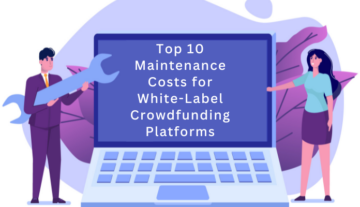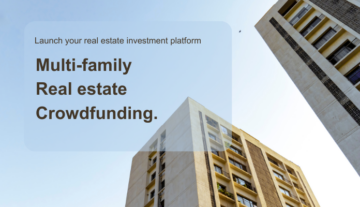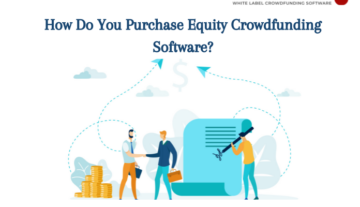
In the world of finance, the digital age has ushered in innovative methods to raise capital for various ventures. Among these, crowdfunding stands out as an increasingly popular and accessible means for entrepreneurs and businesses alike.
Particularly in the real estate sector, crowdfunding is a game-changer for those who may not have been able to participate in real estate investments due to high barriers to entry. It allows individuals to invest in various real estate projects, from commercial developments to residential properties. In this multi-post series, we’ll explore everything you need to know about crowdfunding and real estate.
Real estate crowdfunding is a method of raising capital from multiple individual investors to fund real estate projects. It offers a way for individuals to invest in real estate without the need for large sums of money or extensive market knowledge.
Here’s how real estate crowdfunding works:
- Platform: Investors can participate in real estate crowdfunding through online crowdfunding software specifically designed for this purpose. These platforms connect real estate developers and investors.
- Project Selection: Investors have the opportunity to browse through a variety of real estate projects presented on the platform. They can analyze the details of each project, such as location, property type, expected returns, and investment terms.
- Investment Process: Once an investor finds a project of interest, they can contribute their desired amount of capital. Unlike traditional real estate investments, crowdfunding allows investors to participate with smaller amounts, making it accessible to a wider range of individuals.
- Property Acquisition: Once the necessary capital is raised, the real estate developer proceeds with acquiring the property. The developer then manages the project, overseeing construction or renovation and ensuring the property meets the planned specifications.
- Returns: As the project generates revenue, investors receive returns in the form of rental income, dividends, or a share of profits upon the sale of the property. The platform typically handles the distribution of returns to investors.
- Exit Strategy: Real estate crowdfunding projects usually have a predetermined timeframe, often ranging from a few months to several years. At the end of the project, investors may have the option to sell their shares or continue holding them for potential future returns.
Regulations That Impact Real Estate Crowdfunding: The JOBS Act
There are several regulations and federal laws that regulate the real estate crowdfunding industry. These regulations make it easier to protect investors and their funds while still allowing for these types of investments. In this article, we’ll cover the JOBS Act.
The Jumpstart Our Business Startups (JOBS) Act, signed into law in 2012, revolutionized the investment landscape by reducing regulatory barriers for small businesses. This legislation enables companies to solicit investments from a broader range of potential investors, thereby democratizing access to capital. Furthermore, eliminating geographical constraints opens new avenues for entrepreneurs and investors, regardless of location.
Wrapping It Up
As you can see, real estate crowdfunding has opened up a new world of opportunities for investors to diversify their portfolios and participate in the lucrative real estate market. In our next post, we’ll dive deeper into the different types of regulations that impact real estate crowdfunding and how they protect investors. Stay tuned!
- SEO Powered Content & PR Distribution. Get Amplified Today.
- PlatoData.Network Vertical Generative Ai. Empower Yourself. Access Here.
- PlatoAiStream. Web3 Intelligence. Knowledge Amplified. Access Here.
- PlatoESG. Carbon, CleanTech, Energy, Environment, Solar, Waste Management. Access Here.
- PlatoHealth. Biotech and Clinical Trials Intelligence. Access Here.
- Source: https://www.fundraisingscript.com/blog/crowdfunding-and-real-estate-the-ultimate-guide/?utm_source=rss&utm_medium=rss&utm_campaign=crowdfunding-and-real-estate-the-ultimate-guide
- :has
- :is
- :not
- $UP
- 1
- 2012
- 400
- 500
- a
- Able
- About
- access
- accessible
- acquiring
- acquisition
- Act
- age
- alike
- Allowing
- allows
- among
- amount
- amounts
- an
- analyze
- and
- ARE
- article
- AS
- At
- avenues
- background
- background-image
- barriers
- been
- Black
- broader
- business
- businesses
- by
- CAN
- capital
- color
- commercial
- Companies
- Connect
- constraints
- construction
- continue
- contribute
- cover
- Crowdfunding
- deeper
- Democratizing
- designed
- desired
- details
- Developer
- developers
- developments
- different
- digital
- digital age
- distribution
- dive
- diversify
- dividends
- due
- each
- easier
- eliminating
- enables
- end
- ensuring
- entrepreneurs
- entry
- estate
- estate sector
- everything
- expected
- explore
- extensive
- Federal
- Federal Laws
- few
- finance
- finds
- For
- For Investors
- form
- from
- fund
- funds
- Furthermore
- future
- game-changer
- generates
- geographical
- guide
- Handles
- Have
- here
- High
- holding
- How
- HTTPS
- Impact
- in
- Income
- increasingly
- individual
- individuals
- industry
- innovative
- interest
- into
- Invest
- investment
- Investments
- investor
- Investors
- IT
- Jobs
- jpg
- Know
- knowledge
- Label
- landscape
- large
- Law
- Laws
- Legislation
- location
- lucrative
- make
- Making
- manages
- Market
- max-width
- May..
- means
- Meets
- method
- methods
- money
- months
- multiple
- necessary
- Need
- New
- next
- None
- of
- Offers
- often
- on
- online
- opened
- opens
- opportunities
- Opportunity
- Option
- or
- our
- out
- overseeing
- participate
- Personalized
- PHP
- planned
- platform
- Platforms
- plato
- Plato Data Intelligence
- PlatoData
- Popular
- portfolios
- Post
- potential
- presented
- proceeds
- process
- profits
- project
- projects
- properties
- property
- protect
- protect investors
- purpose
- raise
- raised
- raising
- raising capital
- range
- ranging
- Rate
- real
- real estate
- Real Estate Crowdfunding
- real estate market
- real estate sector
- receive
- reducing
- Regardless
- Regulate
- regulations
- regulatory
- Rental
- residential
- returns
- revenue
- revolutionized
- ROW
- sale
- schedule
- SEC
- sector
- see
- selection
- sell
- Series
- several
- Share
- Shares
- signed
- small
- small businesses
- smaller
- solution
- specifically
- specifications
- stands
- Startups
- stay
- Still
- Strategy
- such
- sums
- terms
- that
- The
- the world
- their
- Them
- then
- thereby
- These
- they
- this
- those
- Through
- timeframe
- to
- traditional
- Transform
- type
- types
- typically
- ultimate
- unlike
- upon
- usually
- variety
- various
- Ventures
- vision
- Vote
- Way..
- while
- white
- white label
- WHO
- wider
- with
- without
- works
- world
- years
- you
- zephyrnet











